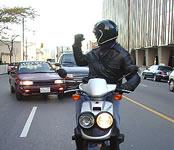| |
 Road rage is a popular topic in the media and the community
these days. Hardly a week goes by without a story about
the roads being a battlefield, and the ever increasing
occurrence of rage on our roads. Road rage is a popular topic in the media and the community
these days. Hardly a week goes by without a story about
the roads being a battlefield, and the ever increasing
occurrence of rage on our roads.
But what is road rage really? When asked, many drivers
would say they have experienced road rage' when other
drivers do something rude, inconsiderate, aggressive or
dangerous. Actions such as cutting other drivers off, tailgating,
not using indicators, swearing and rude gestures are commonly
cited as examples of road rage.
However, the word rage suggests out-of-control anger,
seething hatred, or fury. How often do we really feel like
this while driving? Annoyed, frustrated, or irritated might
be closer to the mark for most of us. Examples of actual
rage, which sometimes end in violence are very serious
but, fortunately also very rare.
So maybe it should really be road frustration not as
newsworthy
but more accurate!
Who is involved?
Research suggests that the vast majority of incidences
of aggressive driving are carried out by males. This is
similar to rates of violent offence as a whole. It also
seems that people who do exhibit aggressive behaviour on
the road are often the same personality types who are involved
in violence in other areas of life, in sport, at work or
in social settings.
Information from police forces around Australia shows
that in many of cases of serious road related violence,
the people involved know each other, and the conflict is
often about something that has nothing to do with the road,
it is just played out there. Research has also indicated
that the incidence of serious assaults, including those
on the roads, have not increased over recent years as is
sometimes suggested in the media.
What can you do?
There are a number of ways that you can reduce the frustrations
of dealing with traffic:
- Plan your drive Too often we make
short and long trips without thinking about how long
the trip will take. Allow plenty of time, especially
at peak traffic periods in the early morning and mid
to late afternoon.
- Look for alternative routes Often
traffic congestion is worst on major arterial roads.
Try to vary your route to avoid these roads where possible.
While it may take you a little longer, it's often far
less frustrating to be moving than sitting in traffic.
- Relax! If you have planned your trip
you should feel more relaxed about the time you have
to get from A to B. Put some enjoyable music on to help
you remain calm.
- Don't drive angry If you are tired
or emotionally stressed it's not a good idea to drive.
You're likely to over-react to the things other drivers
do. Take some time to calm down or rest if you can.
- Use your mobile (hands-free of course!) If,
despite your planning the traffic holds you up, call
ahead to let people know you'll be late rather than taking
risks like speeding and running lights. Most of us are
quite understanding of people held up by traffic as it
happens a lot.
- Be tolerant We all make mistakes
and poor decisions at times on the road. Often drivers
do things because they're easier or quicker if you're
tolerant of others they're more likely to be tolerant
of you.
There are also alternatives to driving which are worth
investigating if you are sick of the commuting grind and
the constant traffic delays:
- Use public transport Although
it can have its own frustrations, public transport
has benefits too. It's likely to be cheaper than
running a car and allows you to sit and read, listen
to music or talk to friends. Even using public transport
once or twice a week might make the days when you
do drive more bearable.
- Car pool with workmates This
gives you a break from driving but still has the
flexibility and convenience of leaving when you want.
It's likely to save you money as well.
- Vary your work arrangements It's
a lot more common now for employers to be flexible
about the hours people work. Can you start earlier
and finish earlier? Leaving later in the morning
can also make a big difference to travel times as
the roads are most heavily congested in the morning
peak periods, often until about the time schools
start their day.
What if the situation gets serious?
Sometimes despite all your best efforts, you may get into
a potentially serious situation on the road. The most important
thing to remember is to avoid inflaming the situation:
- Don't react in any visible way
to the small mistakes or poor decisions of others.
- Avoid eye contact with angry drivers
- while eye contact is useful in certain driving
situations it can inflame the situation where a driver
is angry.
- Keep your hands on the wheel and
don't make gestures. They can easily be misinterpreted
(even shaking your head can enrage someone).
- If you feel you are in a dangerous
situation call for help or drive somewhere where
they are lots of people.
- Finally, do not get out of your
car. This should help you avoid any physical confrontation.
Whether it's road rage or simply frustration, there are
simple steps you can take to maintain your safety.

|

